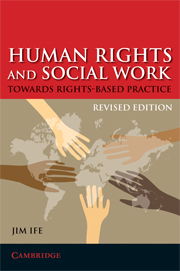Book contents
- Frontmatter
- Contents
- About the author
- Acknowledgments
- Introduction
- 1 Human Rights in a Globalised World
- 2 Human Rights: Beyond Traditional Formulations
- 3 Public and Private Human Rights
- 4 Culture and Human Rights
- 5 Human Rights and Human Needs
- 6 Human Rights and Obligations
- 7 Ethics and Human Rights
- 8 Participation in the Human Rights Discourse
- 9 Constructing Human Rights for Social Work Practice
- 10 Achieving Human Rights through Social Work Practice
- 11 Respecting Human Rights in Social Work Practice
- 12 Conclusion: Prospects for Human Rights Practice
- Appendix I The Universal Declaration of Human Rights
- Appendix II Other Human Rights Declarations, Treaties and Conventions
- References
- Index
4 - Culture and Human Rights
- Frontmatter
- Contents
- About the author
- Acknowledgments
- Introduction
- 1 Human Rights in a Globalised World
- 2 Human Rights: Beyond Traditional Formulations
- 3 Public and Private Human Rights
- 4 Culture and Human Rights
- 5 Human Rights and Human Needs
- 6 Human Rights and Obligations
- 7 Ethics and Human Rights
- 8 Participation in the Human Rights Discourse
- 9 Constructing Human Rights for Social Work Practice
- 10 Achieving Human Rights through Social Work Practice
- 11 Respecting Human Rights in Social Work Practice
- 12 Conclusion: Prospects for Human Rights Practice
- Appendix I The Universal Declaration of Human Rights
- Appendix II Other Human Rights Declarations, Treaties and Conventions
- References
- Index
Summary
The issue of cultural relativism has been a major one for theorists of human rights; arguments about cultural difference represent perhaps the strongest criticisms of the idea of human rights, and for many they are the most difficult to deal with (Brown 1998, 1999). This is especially true for social workers from western traditions, who are generally aware of the role of the west in colonising other world-views and who wish to value cultural diversity. This results in western social workers (among many others) feeling somewhat guilty about supporting something called ‘human rights’ and being particularly susceptible to the criticisms of human rights as a western concept and therefore somehow not to be trusted. The aim of this chapter is to explore this difficult area, with a view to developing an approach to human rights that overcomes these dilemmas.
While it is true that the western cultural tradition has been the origin of many oppressive and colonising practices, including some aspects of conventional social work practice, the feelings of guilt about all things western, so commonly expressed by people like social workers, represents an inappropriate and unhelpful reaction. While there are many things that can be criticised about mainstream western culture, there are other aspects of western culture which, from a human rights perspective, one would want to defend.
- Type
- Chapter
- Information
- Human Rights and Social WorkTowards Rights-Based Practice, pp. 68 - 88Publisher: Cambridge University PressPrint publication year: 2008



